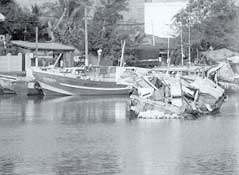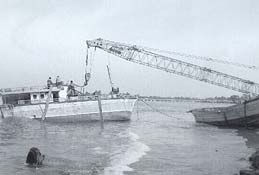THE TSUNAMI: Theological Considerations and Practical Aid
Dear Friends of the Society of Saint Pius X in Asia,
It has been a month now since the tsunami disaster, and I promised to give you some considerations on it from a priest's point of view. I was prompted to put my thoughts on paper while in Sri Lanka recently, having to reply to one specific insulting and blasphemous article. Here is my reply to this article with only very minor additions (mostly quotes), since this time my readers are mostly Catholics (not so in Sri Lanka, with a Buddhist majority).
This comes at the right moment for another reason. The Civilta Cattolica, the famous Jesuit Italian magazine, has just written an article in which the editor begins by discarding absolutely the element of Divine Justice one may see in this natural disaster. The editorial states:
First of all, it must be said that to see divine punishment in natural disasters, because of men's sins, is an error, which puts God, as revealed by Jesus in the Gospel, into question.
Moreover, the article not only eliminates the Divine Justice but boldly presumes that God has saved all the victims!
The way in which this [i.e., how good can come out of evil] takes place is a great mystery for us, but precisely because God is good we must think that he would not permit these painful and tragic events if he was not able and did not have the intention to bring good out of evil for men…. In his paternal tenderness, God was close to each one of those children and saved them in his Kingdom [emphasis mine]. (www.zenit.org, Jan. 20, 2005)
Such Jesuits ought to redo the first week of their own Spiritual Exercises of St. Ignatius.
Some people (The Island, Sri Lanka, Jan. 15, p.7) are wondering where was God on that morning of December 26, and how could a loving God allow such a tragedy, the worst in recent memory?
 |
 |
 |
|
These men lost their fishing boat, their only means of providing for themselves. |
||
This is but a normal reaction of one whose idea of God is very incomplete, erroneous, and, indeed, blasphemous. Back in the 12th century, St. Thomas Aquinas was already answering, in his Summa Theologica, those who object, at the sight of so many evils in the world, that there cannot be a God ruling the universe, that such a God, if He exists, could not, should not tolerate all the evils we see. St. Thomas replied that God is so powerful as to draw good out of evil.
The God of the Christians, the one and only true God, is all-perfect. That means not only all-loving, all-good, omnipotent, all-wise, but also all-just. We think, in our self-centeredness, that God owes us everything here below, that whenever something bad happens, it is the fault of God: "Why did God do that?" In such case we show our shortsightedness, we miss the big picture. Where was God on December 26? "When the waves struck, God was where He always is—on His throne, working out His will, perfectly" (Straits Times, Singapore, Jan. 22, 2005, p.S13). And what was He doing? He was—as He had been doing for centuries, for millennia—ruling every single wave of the ocean:
Who stilleth the roaring of the seas, the roaring of their waves. (Ps. 64:7)
Thou rulest the pride of the sea: when the waves thereof arise, thou stillest them. (Ps. 88:10)
The fact that we are used to the normal cycle of nature manifests that we accept, at least unconsciously, a law for the universe, therefore its Lawgiver. Then, to blame the Legislator for suspending for a few moments the normal rhythm of nature for reasons of His own is sheer blasphemy.
Who are we, who have enough difficulties in ruling our own little lives, to judge the Ruler of the Universe? Listen to Him answering Job—and through Job anyone who asks God the same question:
Gird up now thy loins like a man; for I will demand of thee, and declare thou unto me:
Where wast thou when I laid the foundations of the earth?
Declare, if thou hast understanding.
Who determined the measures thereof, if thou knowest?
Or who stretched the line upon it?
Whereupon were the foundations thereof fastened?
Who laid the corner-stone thereof, when the morning stars sang together, and all the sons of God shouted for joy?
Or [who] shut up the sea with doors, when it brake forth, [as if] it had issued out of the womb;
When I made clouds the garment thereof, and thick darkness a swaddling-band for it, and marked out for it my bound, and set bars and doors,
And said, Hitherto shalt thou come, but no further;
And here shall thy proud waves be stayed? (Job 38:3-11)
Even pagan Greek philosophers, using common-sense principles—such as there is no effect without a cause, no order without a mind ordering things for a purpose—had no problem accepting that there is a Maker of the universe, ruling it, using it for His glory and our own good.
St. Thomas Aquinas taught in one of his sermons (Serm. Dom. 5), that although on one side, "creatures teach us to praise God because all of them do praise Him and invite us to praise Him ('It is surprising,' said St. Augustine, 'that man doesn't praise God unceasingly when all creatures invite him to do so')." On the other side, continues the Angelic Doctor, "we see all the creatures ready to punish those who revolt against God, according to Wisdom (16:24): 'The creature serving Thee, the Creator, is made fierce against the unjust for their punishment.'"
We can add here a passage of St. Ignatius of Loyola, completing what St. Thomas Aquinas said about the creatures at the service of the Creator. In trying to make us understand the gravity of sin and our ingratitude when committing sin, St. Ignatius asks each one of us, in the Second Exercise of the First Week,
to consider what God is, against Whom I have sinned, according to His attributes; comparing them with their contraries in me—His Wisdom with my ignorance; His Omnipotence with my weakness; His Justice with my iniquity; His Goodness with my malice.
Then, this consideration should be followed by
an exclamation of wonder with deep feeling, going through all creatures, how they have left me in life and preserved me in it; the Angels, how, though they are the sword of the Divine Justice, they have endured me, and guarded me, and prayed for me; the Saints, how they have been engaged in interceding and praying for me; and the heavens, sun, moon, stars, and elements, fruits, birds, fishes and animals—and the earth, how it has not opened to swallow me up, creating new hells for me to suffer in them forever!
Need I add that the book of St. Ignatius was approved by more than 40 popes? The bottom line in all this is the mystery of sin, which most of us and most of our contemporaries ignore or have forgotten.
Now, let us apply all this to the tsunami. Why did God allow it? What good can come out of it?
Firstly, on the occasion of this disaster, there have been great acts of charity and of generosity, and these are still being seen from everywhere at the sight of so much suffering.
The tsunami is, moreover, a terrible lesson for the creature who ignores its Creator and His Law, it is clearly an act of the Divine Justice against sins which are a plague to the whole modern world. This ought to be a warning for all. To prove this, let us glance for a moment at three of the areas most hit by the waves: Indonesia, Thailand, and Sri Lanka.
 |
 |
|
|
In the priory, 90 bags of food are ready to be loaded into the van and distributed.
|
In order to get a bag of food villagers had to show a coupon given them beforehand by the head fisherman testifying which ones were really victims of the tsunami.
|
Aceh, Indonesia. There are no doubt good people everywhere, even in Aceh, but Aceh has been well known, for many centuries, for its pirates. Back in the 16th century, St. Francis Xavier had to deplore it. One of his most famous and historically documented prophecies concerns a victory over these pirates (cf. G. Schurhammer, S.J., Francis Xavier: His Life, His Times, Vol. III, Indonesia [1980], pp. 225-241).
Nowadays, this part of the Indian Ocean, the Malacca Strait, is still a very dangerous one for ships. One has simply to search the Internet to find recent documents proving this, such as those published by the International Maritime Bureau describing pirates' various recent attacks.
It is vital that action be taken by Indonesian authorities to ensure that vessels off the northern coast of Sumatra can navigate in safety. (IMB Director, Captain Pottengal Mukundan [Feb. 13, 2004])
Phuket and the Thai coast have beautiful beaches indeed, may be called "Paradise" for their natural beauties, but they are also a hot-bed of prostitution of every kind—a very well known fact.
Unfortunately, Sri Lanka, too, is on the list of the countries where the prostitution of children, especially along the coast, with its "sex tourism," is a real national plague. Where in the world would you find (as one could see in Colombo until recently), as you arrive in a capital's international airport, a huge billboard warning tourists not to touch the children?
Now, it is worth recalling a terrible warning of the Divine Master for such sins:
But he that shall scandalize one of these little ones that believe in me, it were better for him that a millstone should be hanged about his neck, and that he should be drowned in the depth of the sea. (Mt. 18:6)
Such sins cry to heaven for vengeance. God is the defender of the innocent, yes, and He surely has the right to punish nations (and unfortunately that will include innocents as well)—in whatever way He decides—who let their children be thus abused.
In Sri Lanka, we can add another reason for the fury of the sea. The December 26th issue—note the date—of the Sunday Leader (p. 13), in an article entitled "Christians spend Christmas in fear," described the violence against Christians nationwide. It specified that in 2003, 39 churches were attacked in and around the city, with 91 other recorded incidents of arson, desecration of churches, etc., and in 2004, 78 similar incidents were recorded. In the same vein, just before Christmas this year, Buddhists plastered posters on walls, buses, train wagons, etc., insulting Our Lord Jesus Christ with the following: "Jesu baba thoth-tha babek the?—Isn't baby Jesus a helpless, silly baby?" (cf. Catholic Messenger, Jan. 16, 2005, p.2).
Well, we now have the terrible answer to this blasphemous question, from the One Whom "even the wind and the sea obey" (Mk. 4:41).
Be not deceived; God is not mocked: for what things a man shall sow, those also shall he reap. For he that soweth in his flesh, of the flesh also shall reap corruption. But he that soweth in the spirit, of the spirit shall reap life everlasting. (Gal. 6:7-8)
Will man learn from this sad chapter of history? Will man repent from his sins? I doubt it. "With desolation is all the land made desolate, because there is none that considereth in the heart" (Jer. 12:11). Life will go on, sinful habits will continue as if Paradise were to be found on earth. It is not. We were told, by Swiss scientists in 2000, that a megatsunami is very likely to happen soon by the rupture of the Cumbre Vieja, a live volcano in the Canary Islands. Will this imminent danger urge people to make their peace with God? Unlikely. Have mercy on us, O Lord!
Modern madness and foolishness is no different now than it was 2,000 years ago. It is part of fallen human nature to refuse to submit to reality and to the Almighty. It makes man inexcusable, because he refuses to be reasonable, logical. Thus wrote St. Paul facing the same problems 2,000 years ago:
For the invisible things of Him, from the creation of the world, are clearly seen, being understood by the things that are made; His eternal power also, and divinity: so that they are inexcusable. Because that, when they knew God, they have not glorified Him as God, or given thanks; but became vain in their thoughts, and their foolish heart was darkened. For professing themselves to be wise, they became fools, and they changed the glory of the incorruptible God into the likeness of the image of a corruptible man, and of birds, and four footed beasts, and of creeping things.
Wherefore God gave them up to the desires of their heart, unto uncleanness, to dishonour their own bodies among themselves. Who changed the truth of God into a lie; and worshipped and served the creature rather than the Creator, who is blessed for ever. Amen. For this cause God delivered them up to shameful affections. For their women have changed the natural use into that use which is against nature. And, in like manner, the men also, leaving the natural use of the women, have burned in their lusts one towards another, men with men working that which is filthy, and receiving in themselves the recompense which was due to their error. (Rom. 1:20-27)
The final lesson we can draw from all this is what Our Blessed Lord said when news came of the slaughter of some Galileans by Pontius Pilate:
Think you that these Galileans were sinners above all the men of Galilee, because they suffered such things? No, I say to you: but unless you repent, you shall all in like manner perish. (Lk. 13:2-3)
"He that is able to understand it, let him understand" (Mt. 19:12).
Fr. Daniel Couture was ordained for the Society of Saint Pius X at Ecône in 1984. He has been variously assigned as assistant, then prior of Post Falls, Idaho (1984-87); district superior of Ireland (1987-96); and currently superior of the District of Asia (1996- ).


